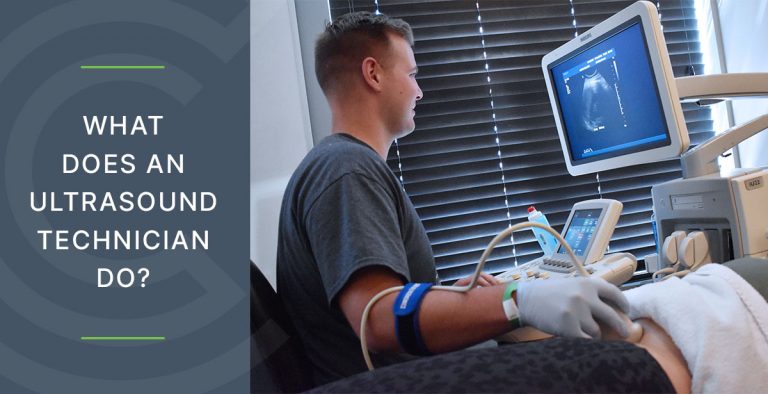Ultrasound scanning, also known as sonography, started becoming widely used in obstetrics and gynecology in the 70’s and continues to evolve as a powerful diagnostic tool today. So powerful, in fact, that jobs for Ultrasound Technicians are growing at a faster than average rate with a projected 19,100 jobs being added to the industry by 2030.* Combine that with the rising demand for healthcare workers, and it’s a great option if you’re looking for a career in the healthcare industry. But what exactly does an Ultrasound Technician do? Let’s start by taking a look at some of the ways ultrasound technology is used.
Uses of Ultrasound Technology
Ultrasound Technicians use imaging equipment that creates high-frequency sound waves to scan and record images in the human body to help doctors and other healthcare professionals diagnose or monitor a patient’s medical condition. There are different specializations within ultrasound technology. One of the most common uses is during pregnancy, to monitor fetal growth and development. Ultrasounds are also used in other areas including:
- Cardiovascular imaging of the heart’s walls, valves, blood vessels and chambers to diagnose a variety of heart conditions
- Breast ultrasound to detect masses or other abnormalities
- Abdominal pain
- Pelvic organs
- Muscles and tendons
Typical Duties of an Ultrasound Technician
Depending on which type of ultrasound technology you choose to specialize in, your duties will vary some. But typically, you can expect to routinely be doing the following:
- Communicate with patients and record any medical details or history
- Ensure ultrasound equipment is functioning correctly
- Prepare ultrasound room for procedures
- Operate ultrasound diagnostic imaging equipment to observe and obtain images of various parts of the human body
- Review images and identify abnormalities or the presence of different medical conditions
- Summarize and record your findings in patient records to assist doctors with diagnosis
Ultrasound technology has played a pivotal role in helping doctors provide better care to their patients. After all, being able to have critical inside information from an ultrasound gives doctors the ability to identify, diagnose, and treat patients from the inside out. As an Ultrasound Technician, you’re an instrumental part of helping care for patients. If you’d like to learn more about a career in ultrasound technology, Caris College offers General Sonography and Cardiac Sonography associate degree programs. With an on-campus clinical lab and experienced instructors with real-world experience to guide you, Caris College is helping students get the hands-on training and skills they need to launch healthcare careers in the world of ultrasound technology. Contact us now to learn more or schedule a campus tour today.
*https://www.bls.gov/ooh/healthcare/diagnostic-medical-sonographers.htm
Become an Ultrasound Technician
